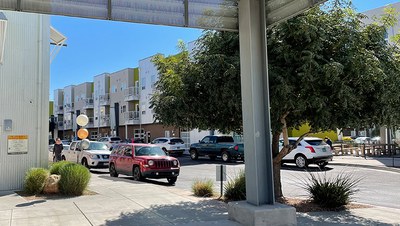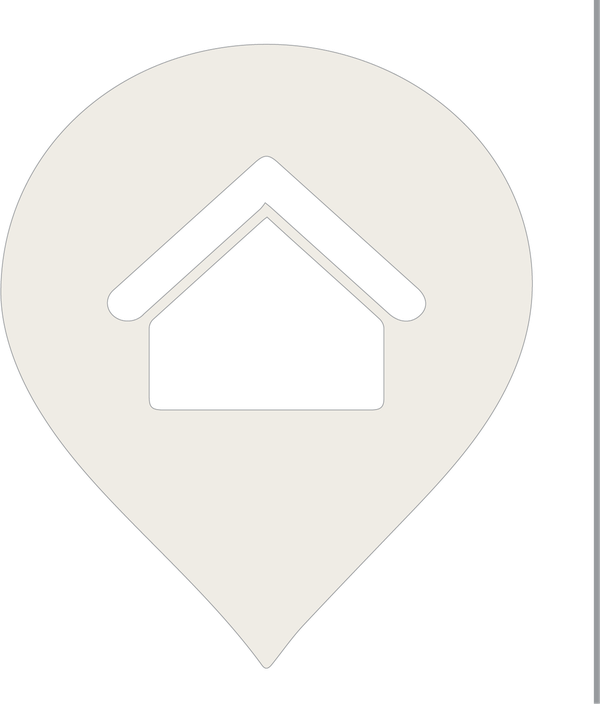About Housing Forward ABQ
Strategic actions to create access to affordable housing for residents in Albuquerque.
Overview

In response to the current crisis in the housing supply for Albuquerque residents, the City launched an emergency initiative to spur access to, conversion and construction of new housing for all segments of the housing market. Addressing the availability of housing for all Albuquerque residents is not only an important part of our strategy to address homelessness, but it is also a key part of our equity, public safety, workforce and economic development strategy.
Over the past several months City officials have consulted with community members, housing industry leaders, and housing providers to discuss ways to address ways to increase housing access, equity and availability. We are proposing policies and programs that will make housing available to all Albuquerque residents, including those who do not currently have equal housing opportunities. Increasing affordable housing units alone will not address the racial inequality gap that harms us all. As part of our housing initiative the City also released a comprehensive needs assessment and set of recommendations to address the structural inequities over time, through policies, programs and projects. It is attached as Appendix 1.
To address access to housing for the most vulnerable, as well as low/median income residents, seniors, and other residents, the City is proposing several housing strategic actions discussed below.
Download the Housing Forward One-Page Overview.



Rising Cost of Housing
Nearly half of ABQ renters are 'cost-burdened' meaning they spend over 30% of their income on housing. We need to increase housing supply and diversity of housing types in our city.
- 4.1% - Year over year rent increase in Albuquerque (Jan. 2025)
- $1,273 - Median 2 bedroom rent in Albuquerque (Jan. 2025)
- 14.6% - Median home cost increase from Jan. 2022
- $365k - Median home price in 2025
Sources
Housing: A Key to Economic Development and Homelessness
The need for more affordable housing in the City of Albuquerque was recently reinforced by new data.
Leadership from the Economic Development Department and the Metropolitan Redevelopment Agency spent an intensive week at Harvard for the Bloomberg Harvard Leading Economic Development in Cities fellowship.
The team analyzed data and economic development theories to look into economic growth potential in Albuquerque. The data points to housing as the main solution to economic growth.
View the presentation detailing their findings and recommendations.
Increasing the Supply of Housing for All Residents
There is a critical need for more housing units to accommodate the existing and future demand for housing at all income levels. To try to address part of the proposed housing shortfall, we are setting a goal of adding at least 5,000 additional housing units above and beyond what the private housing market will provide to the current supply in Albuquerque for the entire range of users. While this will not meet the entire demand for housing over the next several years, it will begin to catalyze the development of various housing types to meet the demands from all segments of the Albuquerque community.*
As Table 1 below details, the estimated housing gap is between 13,000 and 28,000 units depending on type of housing and income. Almost half of all renters spend more than 30% of their household income on rent. And those with lowest incomes face the greatest challenges in housing options.

The City Council recently appropriated $20 million as part of a Gross Receipts Tax Bond to provide more affordable housing. In addition, several federal and state funding sources will help fund more housing for all city residents. To increase supply, the city will need to repurpose existing properties into more housing as well as support new housing development. A number of new initiatives will help with this rehab and conversion.
* These target goals are rough estimates of what the City’s policy and funding interventions could yield. The ultimate mix of strategies and total number of new housing units will likely vary depending on multiple factors including the economy, available funding, and the available housing workforce.
- Converting Hotel/Motel Properties to Supportive/Affordable Housing: recent updates to the Integrated Development Ordinance (IDO) supported by the Administration and Council allow conversion of existing hotel/motel properties into permanent housing units without requiring full kitchen facilities. Currently, this reduced kitchen requirement exception is limited to projects that are funded through Department of Family & Community Services (DFCS). The Administration will propose amending the IDO to open this exception up to all housing developers, regardless of whether project is funded through DFCS. These conversions will help increase the supply of affordable housing units for lower-income residents. The City is currently working on one such conversion, and plans to support additional projects working with private non-profit housing developers. The target occupancy for these motel/hotel conversions is at least 1,000 individuals.
- Converting Commercial/Office Buildings to Housing: the short supply of housing in Albuquerque is in stark contrast to the large supply of vacant or underutilized commercial and office properties. Cities and states are finding ways to support redevelopment of commercial properties into affordable and mixed income housing projects. Mitigating some of the infrastructure costs for these projects will be crucial to making them viable for housing developers. We are proposing a $5 million housing conversion fund using city, state and federal funding to facilitate the conversion of at least 10 commercial/office buildings into housing, creating at least 1,000 new residential units.
- Expanding Nuisance Abatement Laws: properties that are magnets for crime including drug trafficking, human trafficking and gun violence will be the focus of stronger enforcement of nuisance abatement laws. Where possible and appropriate, these properties will be converted to housing units.
- Expanding Housing Workforce: In discussions with industry representatives, one of the biggest challenges to bringing more new or repurposed housing online is the limited availability of construction crews to complete projects. To expand capacity to carry out needed housing initiatives, Albuquerque will need to attract, train and incentivize more construction crews to carry out small, medium and large projects. Using the Job Training Albuquerque program as a model, as well as other state workforce development programs, the City will work with industry and building trades leaders to ramp up workforce capacity for building additional housing. Our goal is to help train at least 250 new housing and construction workers..
- Allowing More Options in Housing Type in City Zoning Code: As Table 1 also details, 63% of all housing in Albuquerque is single family detached. Removing barriers to the construction and renovation of more diverse housing types is critical to accommodating the needs of the various populations in our city: from seniors to families and students. We need to adjust the IDO to provide more options and flexibility for housing developers if we want to address our housing demand. Some proposed changes include:
- Increasing Availability of Casitas (Accessory Dwelling Units ADUs): the city will propose modifications to the IDO to allow more construction and conversion projects in appropriately zoned areas for smaller living area conversions or “casitas.” Allowing more construction of these units will increase the supply of affordable housing while providing additional income for current property owners. With this change we hope the number of ADUs will increase by at least 1,000 units..
- Increasing Availability of Diverse Housing Options: As Table 1 details, the number of multi-unit housing options is far below needed levels to provide residents with the needed range of options in housing type, regardless of whether they are renters or home owners. By modifying the IDO to allow for more options of housing conversion and construction, residents will be able to find housing that meets their financial and family needs. With this change we hope the number of multi-unit housing options will increase by at least 1,000 units..
- Adjusting Parking Requirements: another modification to the IDO supported by the Administration will allow housing developers to adjust parking requirements in appropriately zoned areas to promote higher density and more infill housing. With this change we hope the number of diverse new housing options increase by at least 1,000 units.
Housing Access for All
The City Council appropriated approximately $15 million in the last budget cycle for vouchers for residents needing housing assistance. However, finding rental properties that take vouchers is often difficult for voucher recipients. As Table 1 shows, an estimated 2,200 currently unhoused households need permanent supportive housing. The City’s is working to create more new Permanent Supportive Housing vouchers and Rapid ReHousing vouchers.. For more information on the City’s affordable and supportive housing strategy, see Appendix 2 or view the CABQ Affordable Housing Strategies Plan 2022-2025.
To help make these housing vouchers usable we are undertaking the following initiatives to increase access to existing properties:
- Source of Income Requirements: City Council recently passed an ordinance to prohibit discrimination based on source of income, including use of vouchers. Enforcement of the new ordinance will be an important part of making housing vouchers as effective as possible in housing residents.
- Housing Stability Fund: we are working with community partners to launch a $750,000 landlord mitigation fund to help Albuquerque landlords rent to prospective tenants who might be considered higher risk based on credit history, income or other background concerns. The fund will provide support to landlords and tenants by providing incentives, risk mitigation and assistance paying for some costs related to housing voucher requirements.
- Limiting Short Term Rentals: to increase the number of existing rentals available to local residents, several cities have instituted limits on the number of short-term rentals an individual or business could hold. We are working with property owners and community members to determine the most equitable and effective way to limit short term rentals by out-of-state corporations.
- Tenant Protections: The City will advocate for increased tenant protections to address excessive fees, unfair practices in rental applications and leases and to ensure landlords follow the law.
Partnering with State Government
To supplement and support access and supply of housing of all types in Albuquerque, the City will actively work on legislative initiatives in the 2023 60-day legislative session to increase funding and local legislative authority to increase equity, access and availability of housing. These initiatives include:
- Seeking bold and transformative state investments for housing and redevelopment initiatives. Despite major investments from the City, the amount of funding to address the housing gap is significantly short of what is needed.
- Supporting alternatives to eviction and more protections against unfair housing practices.
- Supporting increased funding for workforce development in the construction and building trades to create the workforce necessary to build needed housing units.
The city will also seek new federal funding support to supplement existing revenue sources being used for affordable housing projects.
Appendices
Appendix 1: Needs Assessment
As part of our housing initiative the City released a comprehensive needs assessment and set of recommendations to address the structural inequities over time, through policies, programs and projects.
Appendix 2: Affordable and Supportive Housing
View the CABQ Affordable Housing Strategies Plan 2022-2025.
The City of Albuquerque helps thousands of low-and-moderate income Albuquerque residents obtain safe, decent and affordable housing every year, by investing in affordable rental housing, supportive housing and homeownership programs.
Affordable Rental Housing
Many people in our community – from working families, to senior citizens, to people with disabilities – need rental housing that is affordable to those with low and moderate income.
The City partners with non-profit developers by providing the funding needed to create additional rental units, either through new construction or acquisition/rehab. The City also provides funding to ensure that existing affordable rental units remain in good condition.
Since 2018, the City has invested $17 million to construct or acquire/rehab new affordable rental units. This investment has created/will create 498 safe, decent apartments, of which 465 will be affordable for low-and-moderate income residents. In addition, since 2018 the City has invested $5.3 million to preserve existing affordable units, which ensured that over 160 households continue to have a safe, decent place to live.
Supportive Housing Vouchers
Supportive housing vouchers help previously homeless households rent an apartment and provide supportive services to those households to help them develop tenancy skills, connect to needed resources and get back on their feet. City of Albuquerque funding for housing vouchers has more than tripled since Fiscal Year (FY) 2018, from $7 million in FY 2018 to $23 million in FY 2023. In FY 2018, the City was only able to help approximately 700 households each year. Once all of the new funding from FY 2023 is rolled out, the City will help approximately 2000 households obtain safe, permanent housing with the support they need to stay housed.
Affordable Homeownership
Working families who are ready to purchase their first home may need some help with down payment and closing costs. Existing low-and-moderate-income homeowners, especially seniors and people with disabilities, may need help paying for repairs in order to stay in their homes.
Since 2018, the City of Albuquerque has provided $3.4 million in down payment and closing assistance to help low-and-moderate income households purchase a home. Nearly 100 households have purchased a home in Albuquerque with this assistance. In addition, the City has invested $3.3 million in a new home rehab program that will help approximately 65 homeowners with major and minor home repairs that will ensure they can safely remain in their homes.
| Description | Statistic | ||
|---|---|---|---|
| Total Housing Units | 247,926 | ||
| Rental Homes | 39.7% | ||
| Owned Homes | 60.3% | ||
| Median Home Value | $204,1001 | ||
| Median Monthly Rent | $889 | ||
| Rent as a % of HH Income >30% | 48% | ||
| Housing Type | One Unit Detached | 63% | |
| One Unit Attached | 5% | ||
| Two Units | 2% | ||
| Three or Four Units | 6% | ||
| Five to Nine Units | 5% | ||
| 10 to 19 Units | 5% | ||
| 20 to 49 Units | 4% | ||
| 50+ Units | 7% | ||
| Mobile Homes | 4% | ||
| New Market Rate Apartments Needed | 13,223 | ||
| New Market Rate Single Family Homes Needed2 | 26,839 | ||
| New Housing Units needed for 30% AMI or below | 15,500 | ||
| New Housing Units needed for 50% AMI | 28,240 | ||
| Unhoused households needing permanent supportive housing | 2,200 | ||
| Occupied Housing Units | 93% | ||
| Vacant Housing Units | 7% | ||
(Sources: 1. American Community Survey Data 2021; 2. Todd Clarke Data Analysis 2022; 3. Urban Institute’s Albuquerque Affordable Housing and Homelessness Needs Assessment 2021).
